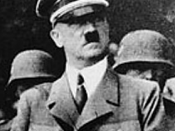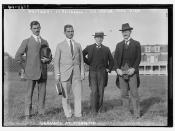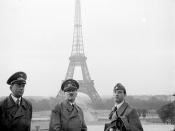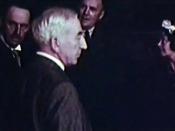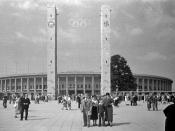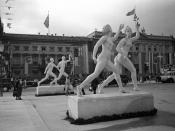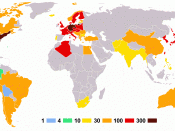"The most controversial Olympics" an outtake from Allen Guttmanns' "The Olympics: A History of the Modern Games", tells the story of the story of the 1936 Olympic games in Berlin Germany as well as the controversy surrounding it. The facilities and the spectacles of the game were great but they were only superficial. Under the surface of the 1936 Olympics was undeniable corruption.
The battle for hosting the games was between Berlin Germany and Barcelona Spain, but Berlin was selected after winning the vote with a convincing margin of forty-three to sixteen. At this time in 1931 Hitler was not in command of Germany but did become so in 1933, this was not anticipated when Germany was selected and may have changed the vote if it was. One problem with having Hitler in power was that he was opposed to modern sport, and the Olympics are modern sports.
The Nazi's did not like modern sport because they thought of it as being to involved with other cultures around the world and not patriotic enough: ""æModern sports-in theory if not in practice-is equality: neither race nor religion nor ideology should be a factor in determining athletic excellence."(53-54). So of course this kind of an idea is defiantly one that the Nazi's were opposed to. With the Nazi's beliefs in racial supremacy they had no belief in equality to anyone, especially for blacks and Jews. The games were even condemned by a Nazi representative because they were "infested with Frenchman, Belgians, Pollaks, and Jew-Niggers"(54). Even when the rest of the world was getting into games like soccer, basketball and many others Germany did not. Instead they participated mainly in Gymnastics, but refused to compete rejecting invitations to compete in the Olympics and other games in the past. Some members of the organizing committee were worried that Hitler would cancel the games because of the international aspects. But to their surprise he did not, instead the situation was looked at as ""æsplendid opportunity to demonstrate German vitality and organizational expertise."(55). Hitler even gave full financial support to the organizers. Even though Hitler was in favor of the Olympics being held in Germany it was worried that he would not abide by the Olympic rules concerning equality, especially the right for German Jews to try out for the national team. However the Germans give a written guarantee that German Jews would have the chance to try out for the national team, much to the surprise of many. But even though they were agreeing to follow by the rules the reliability of the Nazi's claims were in question over and over again. Because of all of the skepticism an inspection was made, with the results being that it was likely, according to the Nazi's, that Jewish athletes would make the National team. The inspector went back to the United States saying that they should accept the invitation. A strange thing happened when a man name Sherrill had an interview with Hitler; when asked about the pledge made by the Nazi's that all Germans were allowed to try out for the team Hitler said that Jews would not be allowed on the team. In another interview a little while later Hitler said that Jews were allowed to compete. So to make himself look good to the rest of the world Hitler allowed two members of mixed ethnicities to compete on the German team, Rudi Ball a hockey player and Helen Mayer an Aryan looking woman who did not consider herself a Jew. One strange thing was that a German high jumper, with dark hair, was deprived of a spot even though she jumped four centimeters higher than anyone else. Hitler also showed his racism in that he refused to shake hands with Jesse Owens, a black athlete from America who set Olympic records in three events. Looking past the controversy for a moment, the facilities for the games were amazing. A stadium was expanded to fit 110,000 people, an open aired pool was constructed to fit 18,000 spectators, there were over 100 buildings to house the athletes, 38 dining halls, a 400 meter track, a pool, and an artificial lake. These facilities were all found in the Olympic village for training. This Olympic games was transmitted over short-wave radio and television, connecting the whole world to the 1936 Olympic games.
This was a great article the Guttmann really did well in putting the information together in a way that kept you interest. I especially enjoyed it because it is about a subject that I have a lot of interest in, also the article went completely in chronological order I liked that because it was easy to put it all together in my head after. It proved to be very useful in my understanding the games and forming my own opinion about the happenings.
My favorite part of the article had to be when it talked about an interview between Sherrill and Hitler. It seemed that since Hitler contradicted what the representatives for the Nazi's said that he did not really know what was going on in his own country. But what shocked me even more about this situation was that Sherrill spoke afterwards of Hitler's great character. I found that really strange considering that the one thing Hitler did not a have was a good character.
Works Cited Allen Guttmann, ch.4, "The most controversial Olympics," in The Olympics: A History of the Modern Games (Urbana and Chicago: University of Illinois Press, 1992), 53-71.
